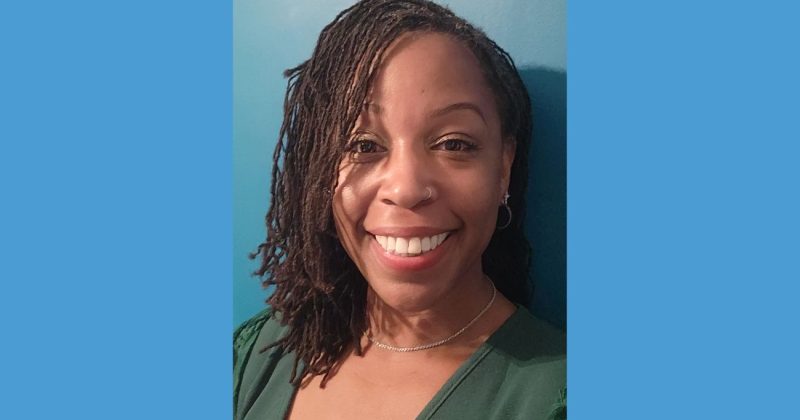
Susan O'Rourke | November 13, 2023
Global teaching plays a crucial role in shaping the future by empowering students with knowledge, promoting cultural understanding, addressing global challenges, and building a more peaceful and prosperous world.
This month we are excited to feature Philia Leach of Ben L. Smith High School as our Global Educator Spotlight! Philia teaches mathematics at Ben L. Smith High School, which she notes is “located in the Southwestern quadrant of Greensboro. The high school is home to students from forty-four different countries, reflecting the city’s diversity and “adding to the richness of the school population.”
Philia’s commitment to global education comes, in part, from her commitment to serving students from all cultures. Philia shares:
Teaching at a school that represents forty-four different countries and is a melting pot of diversity, culture, and experiences made me interested in globally focused instruction. Being intentional in making sure that students know they are important, valued, and seen, is the reason I sought out the UNC World View program. Teaching from a global perspective allows students to see their culture and themselves in education and allows them to understand the interconnectedness of today’s world.
Philia emphasizes that global education not only develops culturally competent students but also gives students the skills needed to succeed in their education, the workplace, and their communities. Philia explains that, by infusing her courses with global perspectives, she cultivates students’ “[awareness] of global issues” and “[empowers them] to make positive contributions towards addressing them.” Further, globally focused lessons teach students “critical thinking, problem-solving, and collaboration skills needed to engage with global challenges.”
Philia is an active part of global professional development communities, both at Ben L. Smith High School and through the UNC World View Teacher-Student Initiative. Philia explains:
Working at an Opportunity Culture School as an Extended Impact Teacher, I am able to lead PLC meetings using data collected from student work to drive curriculum decisions. I am also able to share ideas that I have learned in the UNC World View program with my colleagues, allowing them to share my vision. This is important to me because collaboration grows students.
For the past two years, Philia has demonstrated her leadership as a global educator and commitment to bringing global issues right into her classroom through her involvement in the Teacher-Student Initiative. Through this UNC World View program, Philia and other NC educators have worked with faculty members and strategic partners to strengthen their understanding of an interdisciplinary global theme, integrate this learning into their current curriculum, and connect students virtually with global experts on World View Students Day. Philia shares how impactful her participation in the program, “From the Land to the Sea: Exploring Ecuador’s Rich Culture and the Biodiversity of the Galápagos,” was on her teaching. She explains:
I had such an eye-opening experience with my students last year using a Galapagos Island-inspired lesson plan, that I decided to create a service-learning project this year that addresses food deserts and food insecurities. The goal is to encourage students to engage in service-learning projects that address global issues that are relevant in their community, allowing students to apply classroom knowledge in real-world situations that are applicable to their current life circumstances.
She continued to share the impact of the Teacher-Student Initiative and the engaging sessions she participated in through the Initiative:
My experience as a participant in the Teacher-Students initiative was very beneficial because I had the opportunity to collaborate with teachers and students to foster cross-cultural understanding and global competency skills. Attending the K-12 Global Education Symposium was interesting and useful because teachers shared their expertise on how to support teachers in designing global-themed lesson plans to enhance their student’s learning experiences. This was impactful to my teaching because I learned that I can gradually incorporate global experiences without feeling overwhelmed, yet students still can see themselves, their culture, and their community in mathematics.
Philia continues to enrich her curriculum as she has joined the 2023-2024 cohort of the Teacher-Student Initiative. This year’s program, “Nourishing Traditions, Nourishing Lives: Where Tradition Meets Progress in South Africa,” partners educators with Prof. Gina Chowa and our strategic partner in South Africa who will discuss the interventions made to improve employment, economic security, health, and education in South Africa as well as South Africa’s diverse culture and complex history. We can’t wait to see the fascinating lesson Philia will develop this spring!
Philia further encourages educators interested in globalizing their courses and building a community of global educators at their school to approach the “process [by] being intentional.” She emphasizes that “teachers must take the time to get to know their students” as they develop engaging, globally focused lessons. She also encourages fellow educators to take things step-by-step and to
understand that you can start with small global activities that are not overwhelming to the curriculum. Through global teaching, individuals can learn about different cultures, traditions, and perspectives from around the world. This leads to a greater appreciation of diversity and helps promote tolerance, empathy, and cross-cultural understanding.
We are so grateful for Philia’s commitment to global education, investment in and appreciation for her students’ diverse experiences, and leadership in supporting fellow educators! We value having Philia as a part of our World View community of educators who (in Philia’s words) truly understand that:
Global teaching plays a crucial role in shaping the future by empowering students with knowledge, promoting cultural understanding, addressing global challenges, and building a more peaceful and prosperous world.
